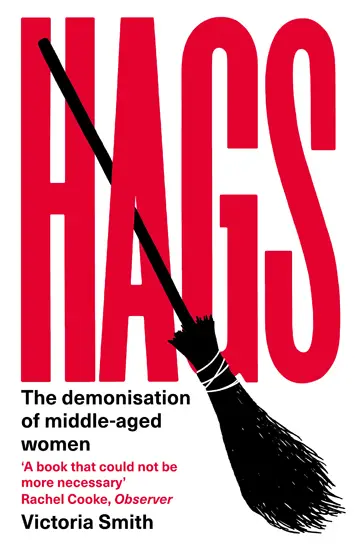Hags: The Demonisation of Middle-Aged Women by Victoria Smith – Review

By Clare Jenkins
Thirty years ago, way before LGBTQI+ politics became A Thing, I did an MA in Women’s Studies. And I was taught – by an admirably monstrous regiment of women – that we were all fighting The Patriarchy.
I’d been to Greenham Common as a journalist and seen dungaree-clad women protesting against the phallic symbol of nuclear weapons. I’d read Mary Wollstonecraft’s seminal [sic] 1792 tract A Vindication of the Rights of Women, Germaine Greer’s The Female Eunuch, Betty Friedan’s The Feminine Mystique. For my dissertation, I read about the early Christian fathers who had damn near relegated women to the level of animals, seriously debating whether we were sufficiently evolved to have souls, or were simply bodies. Scary bodies at that – unpredictable ones that might bleed at any moment or suddenly sprout breasts, hair, babies.
I learnt about a system that kept birth control away from women in order to keep them in their place: pregnant, financially dependent on their menfolk, wiping noses, bottoms, floors and kitchen sinks. I watched – and laughed at – TV comics depicting older women as battleaxes, interfering mothers-in-law or shrill shrews.
And I celebrated the 1967 double whammy of the Abortion Act and a Family Planning Act that gave unmarried women the right to the Pill, previously prescribed only to the married. Three years later, thanks to Labour’s tenacious Barbara Castle, the Equal Pay Act became law.
So who would have thought that, in the 21st Century, The Patriarchy would be joined in its deviously misogynistic ways by another: The Matriarchy? Young female ‘social justice warriors’ wearing face masks and rainbow badges, shouting slogans and abuse through megaphones, and banging on about TERFS (‘trans-exclusionary radical feminists’), collaborating with faux-liberal young men to keep other, older women in their place. A place where women no longer ‘own’ womanhood. Because that concept is so outdated, so ‘binary’, so ‘cis’, that any enlightened feminist today is expected to laugh scornfully at the very idea that only women can have a uterus, menstruate, gestate, give birth, breastfeed. Today’s orthodoxy would have it that we’re all gender-fluid from birth.
I wonder if they’ll feel the same when they get to the menopause?
These TERF wars are being fought all around us – in nurseries and universities, at supermarkets where staff wear pronoun badges, infecting NHS literature and police and council guidance. And a major battleground is social media, specifically Twitter. If you’ve missed the labyrinthine debates there and in the mainstream media about gender politics and trans issues, you may at times be bewildered by some of Victoria Smith’s arguments. But with Twitter being the latest landscape for the scold’s bridle and the ducking-stool, Hags is an important, wide-ranging contribution to those debates.
Setting the scene, she references Glenn Close as a bunny-boiling ‘psychobitch’ in Fatal Attraction, Roald Dahl’s The Witches, numerous wicked stepmothers (fear and loathing in fairyland), and the beauty myths of Barbie, Instagram and Love Island. Then there’s the ‘Karen’ figure, “‘an obnoxious, angry, entitled, and often racist-middle-aged white woman who uses her privilege to get her way or police other people’s behaviours’.” Otherwise translated as a confident older woman, accepting of her sexuality, financial and social status, who no longer needs to take any nonsense.
According to Smith, “The post-‘sex wars’ period of the nineties saw the rise of raunch feminism, do-me feminism, power feminism, post-feminism, girl power and a whole host of other capitalist misappropriations of women’s liberation.”
Now, by following the law of divide and rule, its latest manifestation is an inter-generational Women Beware Women: youth vs age. Many of my friends have daughters now in their late 20s, early 30s. I’d always regarded them as equals whose company and conversation was stimulating and thought-provoking. I fondly imagined they felt the same about me.
Reading Hags, though, I now wonder if they look at me and think scornfully, ‘Move over, dear, you’re out-of-date, past your sell-by-date…’
Every new generation believes it can change the world – without that evolutionary belief, you court despair. Maybe today the troubles of the world are so huge that, instead, the 20- and 30-somethings prefer to turn their attention to an easy target: older women. Women who, by sometimes disagreeing with their daughters and grand-daughters, must be stupid or villainous and taking up valuable space.
 “Many of the arguments are pertinent”
“Many of the arguments are pertinent”
According to Smith – who admits that one opponent denounced her as “a batsh*t Mumsnet thread made flesh” – , Gen Z (Zoomers) and Millennials are at best dismissive of, at worst vilifying, the older generation of J.K. Rowling, Helen Joyce, Kathleen Stock and others who question the whole idea of gender as a cloak (or dress) you can put on and take off at will.
Back in the 70s, Second Wave feminists thought the equality war would have been won by now. How could they know that, in fact, they were giving birth to children who, like the crab spider, would eventually turn round and eat them?
One argument here is that female-to-female ‘hag-hate’ is passed down from mother to daughter. Maybe I’ve rewritten my own history, but I don’t remember ever feeling that way about my mother’s generation. Maybe that’s also why certain statements left me baffled. For instance: “From the moment we are born female, we are conditioned to feel ashamed not just for our appearance, our biology and our desires, but also of other women and our connection to them.”
Really? I was brought up a Catholic and yes, we were told to keep mum (as it were) about our periods (‘the curse’), fight our carnal cravings and study the stories of the Virgin Martyrs. But it doesn’t seem to have done me – or any of my female friends – any lifelong harm.
A major thesis is that older women are maligned, their life-experience counting for nothing, their views outdated, and they’re caught in the crossfire between the old patriarchal system and the new band of virtue-signalling feminists.
“Misogyny flourishes in spaces where it can be made to appear virtuous”, she writes. And much of the current ageist discourse can seem at times to resemble playwright Arthur Miller’s The Crucible, where the children sentence their wiser elders to death with false accusations.
Chapters address the worlds of beauty and ‘body positivity’, work and motherhood, health and ‘the toxic culture of self-improvement’. Why are some women so terrified of ageing, they fall for “the gilded-cage bullsh*t that is femininity”? Why do we allow gay designers to dictate our look, male plastic surgeons to pump up our lips and breasts, creating a whole Insta cast of female Frankensteins? Who would have thought, 30 years ago, when women were campaigning against The Sun’s Page 3 girls that pornography would become not just acceptable but almost mandatory, men’s urges (both financial and sexual) persuading women that they’re not completely liberated unless they agree to mock-strangling during violent sex?
Hags is not always an easy read, being at times dense, repetitive and dispiriting. But many of the arguments are pertinent, not least about the continuing calculating ways of the “patriarchal protection racket”: women falling behind men in the workplace and in pay and pension scales, still shouldering the burden of both childcare and domestic labour, not to mention employment in the so-called caring sectors.
There are many such areas where some of the modern, self-righteous Witchfinder Generals might do better putting their energies. Financial and educational inequalities, human trafficking and other exploitations of the poor and dispossessed, dire threats to the NHS – and, yes, climate change. Aren’t these actually rather more important than ‘identity-politics’?
Yet, according to Smith, in some ‘progressive’ circles, the ardent belief is that “feminism will be great, once we’ve cleared away the debris, the old women, the bad feminists. Once we’re rid of the bigots who spoil the party, the bad fairies at the christening, our purified souls will ascend to feminist heaven.”
Well, dream on, darlings. Because until women act together in solidarity rather than shout at each other across the generational divide, patriarchy will always win.
‘Hags: The Demonisation of Middle-Aged Women’ by Victoria Smith is published by Fleet Publishing, £20 hardback








